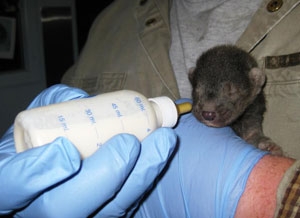Posts Tagged: Rick Sweitzer
Four baby fishers to be closely monitored by scientists
Four Pacific fisher kits who were returned to the wild last week will be closely monitored by UC Berkeley wildlife biologists who are interested in knowing how the animals assimilate to the forest after being reared in captivity, according to the Fresno Bee.
The kits were rescued last May, when their mothers - part of a multi-year Pacific fisher study - were killed, one by a bobcat, the other by a car. UC Berkeley wildlife biologist Rick Sweitzer delivered the animals to the Fresno Chaffee Zoo, where they were nursed to health.
Zoo veterinarian Lewis Wright told Bee reporter Marc Benjamin that zoos are preferable to ordinary veterinary hospitals for weasel-like fishers because the wild animals are susceptible to dog and cat illnesses. The juvenile fishers were later pen reared near Bass Lake.
The fisher rescue and release became part of the seven-year Sierra Nevada Adaptive Management Project, in which fishers are fitted with radio transmitter collars and monitored to study their fate in a forest ecosystem subject to timber harvest and development.
Currently 23 fishers are monitored daily. Scientists surgically implanted transmitters in the four fishers released last week to eliminate the risk of losing their collars.

A fisher peeks out of a temporary enclosure during release.
Pacific fisher kits returned to the wild
Four baby Pacific fishers were released in the forest this week, with the aid of UC Berkeley scientists who are studying the Sierra Nevada population of the rare weasel-like carnivore.
Pacific fishers were once an abundant species, but the population has been in decline for more than 20 years. As part of the Sierra Nevada Adaptive Management Project (SNAMP), an ongoing study aims to determine what factors are influencing the fishers' fate, such as habitat loss, timber harvest, disease, development and climate change.
"We are extremely excited that the four fisher kits have been repatriated back out in the forest, where we hope they will survive and become part of the fisher population in this area," said Rick Sweitzer, UC Berkeley Research Wildlife Biologist and Adjunct Associate Professor.
Last May, two fishers being monitored as part of the SNAMP study were killed – one by a bobcat, the other hit by a car on Highway 41. It just so happened they were both nursing mothers.
“We knew that the female fishers had kits, and that these animals are rare in California,” Sweitzer said. “We couldn’t in good conscience let the baby animals perish in their den cavities knowing we might be able to intervene.”
The scientists staged two daring rescues and spirited the babies to the Fresno Chaffee Zoo for care. In time, the young animals were moved to a large pen and taught to hunt live prey by a regional wildlife rehabilitation organization. The young fisher kits have been under the care of the Fresno Chaffee Zoo, by agreement with the California Department of Fish and Game. Last week, the Department of Fish and Game gave approval for the "juvenile" fishers to be released back out into the forest.
"We aided this process by finding the most appropriate release areas where the animals will be most likely to find food in good quality fisher habitat," said Sweitzer.
Two of the fisher kits were released in the west Kaiser area. Two others were returned to the Beasore Road/Chilkoot Lake area of the Sierra National Forest, close to where their mother was killed in the SNAMP study area.
Unusual circumstances precipitated the two fishers' release into an area where their population is being researched. Late last year, two fishers died during captures when they were given anesthetic agents from a particular production lot that, unbeknownst to the scientists, had been causing serious problems with domestic pets and other animals and were subsequently recalled, but not until after both fisher deaths had occurred. With permission from the California Department of Fish and Game, two of the fisher kits replaced the two that died because of the research project.
Read more about the UC Pacific fisher study.

A young Pacific fisher steps out into wildnerness.
Pacific fisher orphans on Fresno TV
Five Pacific fisher orphans were featured on Fresno's KSEE Channel 24 news last Friday. The story includes great video of the five tiny, weasel-like animals now being cared for at the Fresno Chaffee Zoo.
The orphaned fishers were rescued by an Oakhurst-based UC Berkeley team that is studying the Pacific fisher population in the southern Sierra Nevada. The animals are the offspring of two fisher females that were part of the study. One was killed by a bobcat, the other hit by a car. Get all the rescue details in this UC news release.
Unfortunately, the Channel 24 story omitted the fact that researchers are looking for support from the community to care for the fishers so they can be returned to the wild. To make a contribution for milk replacement formula and supplies to build a temporary habitat, contact Anne Lombardo of UC Cooperative Extension at amlombardo@ucdavis.edu, (559) 676-0576.
The Pacific fisher story also appeared in the Sierra Sun Times and Yubanet.com.

UC research crew member uses tree climbing equipment to reach orphan fishers in an unstable snag.


